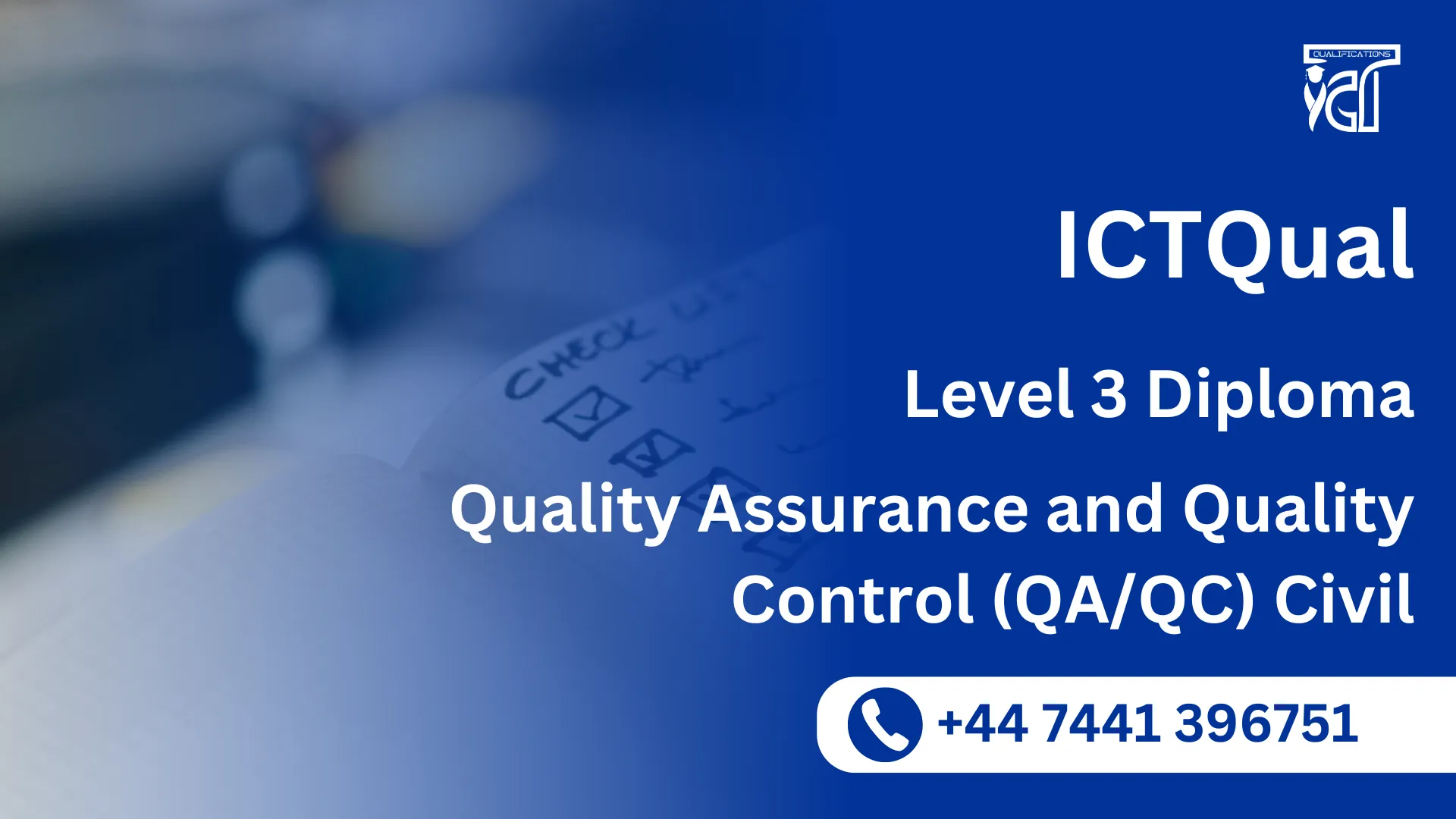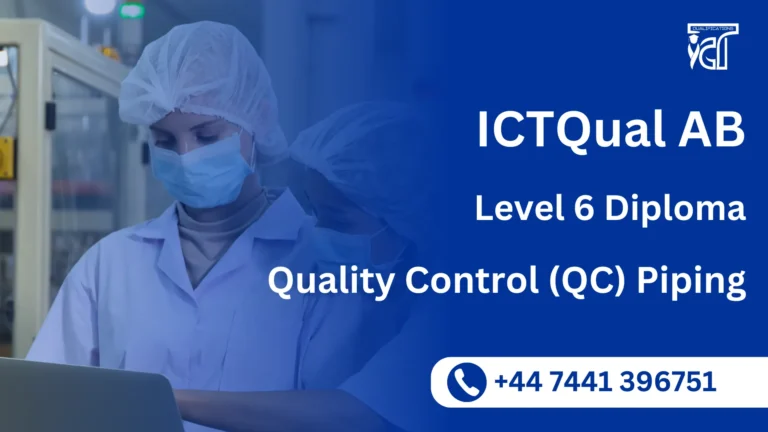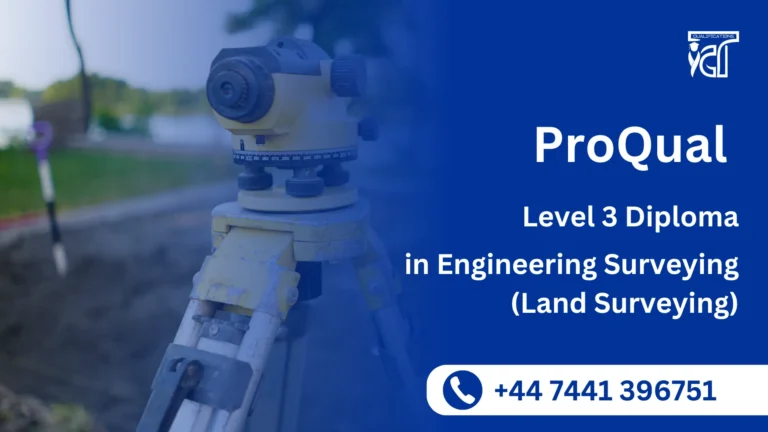The ICTQual Level 3 Diploma in Quality Assurance and Quality Control (QA/QC) Civil is designed to provide learners with a strong foundation in civil engineering quality practices. This entry‑level qualification introduces the essential principles of QA/QC, focusing on inspection, testing, and compliance to ensure safety and reliability in construction projects.
Through a structured curriculum, learners gain knowledge of international standards, basic inspection techniques, and quality frameworks relevant to civil engineering. The program emphasizes practical understanding, enabling participants to apply QA/QC concepts in real‑world scenarios such as building sites, infrastructure projects, and civil works.
The diploma develops key skills in identifying defects, supporting corrective measures, and assisting with documentation and reporting. By learning the fundamentals of quality assurance and control, learners build confidence to contribute effectively to project teams and uphold industry standards in civil engineering.
Graduates of this qualification are prepared for entry‑level roles such as QA/QC Assistant or Junior Civil Inspector. The program also serves as a stepping stone to higher‑level diplomas and specialized certifications, opening pathways to career growth in construction, infrastructure development, and global civil engineering projects.
ICTQual Level 3 Diploma in Quality Assurance and Quality Control (QA/QC) Civil
This qualification, the ICTQual Level 3 Diploma in Quality Assurance and Quality Control (QA/QC) Civil, consists of 6 mandatory units.
| Sr# | Unit Title |
| 1 | Principles of Quality Assurance in Civil Engineering |
| 2 | Civil Engineering Materials and Testing |
| 3 | Construction Site Quality Control Practices |
| 4 | Health, Safety, and Environmental Standards in Civil Projects |
| 5 | Technical Communication and Reporting for QA/QC |
| 6 | Workplace Skills for Civil QA/QC Learners |
Learning Outcomes for the ICTQual Level 3 Diploma in Quality Assurance and Quality Control (QA/QC) Civil:
Principles of Quality Assurance in Civil Engineering
- Understand the fundamental concepts of quality assurance and quality control in civil engineering.
- Recognise the importance of quality frameworks and compliance with international standards.
- Apply basic QA/QC procedures to ensure accuracy and reliability in civil projects.
- Identify the roles and responsibilities of QA/QC personnel within construction teams.
- Analyse how quality assurance contributes to safety, efficiency, and sustainability in civil works.
- Develop the ability to interpret quality policies and integrate them into project workflows.
- Evaluate the impact of poor quality management on project outcomes and organisational reputation.
- Demonstrate awareness of continuous improvement practices in civil engineering projects.
Civil Engineering Materials and Testing
- Identify the properties and classifications of common civil engineering materials.
- Understand the principles of material selection for durability, strength, and sustainability.
- Conduct basic laboratory and field tests to assess material quality.
- Interpret test results and apply findings to ensure compliance with project specifications.
- Recognise the importance of material certification and traceability in QA/QC.
- Apply knowledge of testing standards (e.g., ASTM, ISO) to civil engineering contexts.
- Evaluate the consequences of material defects on structural performance and safety.
- Develop practical skills in documenting and reporting material testing outcomes.
Construction Site Quality Control Practices
- Apply inspection techniques to monitor construction activities and ensure compliance.
- Understand the role of site supervisors and inspectors in maintaining quality standards.
- Implement quality control checklists and documentation procedures on-site.
- Identify common construction defects and propose corrective actions.
- Monitor workmanship to ensure alignment with design specifications and codes.
- Recognise the importance of coordination between QA/QC teams and contractors.
- Evaluate the effectiveness of site quality control systems in preventing rework.
- Demonstrate the ability to maintain accurate records for audits and project reviews.
Health, Safety, and Environmental Standards in Civil Projects
- Understand the relationship between quality assurance and health, safety, and environment (HSE).
- Apply basic HSE regulations and compliance requirements in civil engineering projects.
- Recognise common workplace hazards and implement preventive measures.
- Promote sustainable construction practices that minimise environmental impact.
- Analyse the role of QA/QC in ensuring safety and environmental protection.
- Develop awareness of risk assessment and mitigation strategies in civil projects.
- Demonstrate knowledge of emergency procedures and incident reporting.
- Evaluate the importance of integrating HSE standards into quality management systems.
Technical Communication and Reporting for QA/QC
- Develop effective written communication skills for technical reports and documentation.
- Prepare inspection reports, non-conformance reports, and quality records.
- Use clear and concise language to communicate technical findings to stakeholders.
- Apply standard formats and templates for QA/QC documentation.
- Recognise the importance of accurate record-keeping for audits and compliance.
- Demonstrate skills in presenting quality data through charts, tables, and summaries.
- Communicate effectively with engineers, contractors, and project managers.
- Evaluate the role of communication in resolving quality-related issues.
Workplace Skills for Civil QA/QC Learners
- Demonstrate professional ethics and integrity in QA/QC roles.
- Develop teamwork and collaboration skills for working in multidisciplinary environments.
- Apply problem-solving techniques to address quality challenges in civil projects.
- Manage time effectively to meet project deadlines and quality requirements.
- Build confidence in decision-making and accountability within QA/QC tasks.
- Recognise the importance of adaptability and continuous learning in the workplace.
- Develop interpersonal skills for effective interaction with colleagues and clients.
- Evaluate personal strengths and areas for improvement in professional practice.
The ICTQual Level 3 Diploma in QA/QC Civil provides learners with a strong foundation in civil engineering quality practices. It equips participants with the essential skills to support inspection, testing, and compliance processes, preparing them for entry‑level roles in QA/QC.
Foundational Knowledge in QA/QC
- Introduction to QA/QC principles in civil engineering projects.
- Understanding of inspection and testing methods for construction and infrastructure.
- Knowledge of compliance frameworks and industry standards.
- Ability to support quality assurance processes in civil works.
Practical Industry Relevance
- Exposure to real‑world QA/QC practices in construction and infrastructure.
- Skills to assist with documentation, reporting, and corrective measures.
- Confidence to apply QA/QC basics in building sites and civil projects.
- Preparation for advanced training in higher‑level QA/QC qualifications.
Career Development Opportunities
- Access to entry‑level roles such as QA/QC Assistant or Junior Civil Inspector.
- Enhanced employability in industries where civil quality is critical.
- Opportunity to build credibility in civil quality management.
- Foundation for progression into Level 4 and higher QA/QC diplomas.
Professional and Personal Growth
- Development of attention to detail and problem‑solving skills.
- Improved understanding of safety and compliance standards.
- Confidence to contribute to team‑based quality projects.
- Commitment to excellence in civil engineering practices.
The ICTQual Level 3 Diploma in QA/QC Civil is designed for learners who are beginning their journey in civil engineering quality management. It suits individuals seeking entry‑level opportunities, those wishing to formalize their technical knowledge, and learners aiming to progress into higher qualifications in QA/QC.
Entry-Level Learners in Civil Engineering
- Individuals starting their careers in civil or construction fields.
- School leavers or vocational learners seeking practical QA/QC knowledge.
- Those interested in inspection basics and compliance standards for civil projects.
- Learners motivated to gain industry‑relevant skills for career entry.
Aspiring QA/QC Professionals
- Learners aiming to specialize in QA/QC civil systems.
- Individuals seeking to understand inspection and testing processes.
- Those motivated to support quality assurance teams in construction and infrastructure projects.
- Learners eager to progress into advanced QA/QC qualifications.
Career Changers and Technical Enthusiasts
- Individuals transitioning from related fields such as mechanical trades, construction support, or maintenance.
- Technical enthusiasts interested in civil quality systems.
- Those seeking to formalize practical experience with a recognized qualification.
- Learners motivated to explore opportunities in industries where QA/QC is critical.
International and Diverse Learners
- Learners from different backgrounds seeking global exposure to QA/QC practices.
- Individuals aiming to meet international compliance standards.
- Professionals interested in working with multinational engineering firms.
- Those who value cultural awareness and global perspectives in civil QA/QC.
The ICTQual Level 3 Diploma in QA/QC Civil provides learners with a strong foundation in civil engineering quality practices. After completing this qualification, graduates can progress into higher‑level diplomas, industry certifications, and entry‑level career opportunities that build on their skills.
Progression to Higher Qualifications
- Pathway to ICTQual Level 4 and Level 5 Diplomas in QA/QC Civil or related engineering fields.
- Eligibility for advanced technical training in civil inspection, non‑destructive testing (NDT), or compliance auditing.
- Opportunity to specialize further in areas such as safety management or quality systems.
- Foundation for continuous professional development in QA/QC and civil engineering.
Career Opportunities
- Entry‑level roles such as QA/QC Assistant or Junior Civil Inspector.
- Opportunities in industries including construction, infrastructure development, and oil & gas.
- Ability to support inspection teams with documentation, testing, and compliance tasks.
- Stepping stone to supervisory roles with further study and experience.
Professional Certifications
- Access to industry‑recognized QA/QC certifications in civil engineering.
- Preparation for specialized credentials in compliance and auditing.
- Enhanced credibility when applying for technical or quality‑related positions.
- Alignment with international standards valued by global employers.
Global Career Pathways
- Opportunities to work with multinational companies in civil QA/QC.
- Recognition of skills across diverse industries worldwide.
- Potential to contribute to international projects requiring QA/QC expertise.
- Career mobility across global engineering and quality assurance sectors.
Entry Requirements
Learners must meet the following criteria to be considered for admission into the course:
- Age Requirement: Learners must be 18 years or older at the time of enrollment.
- Educational Background: A secondary school certificate or equivalent qualification is generally expected. Vocational or technical training in civil engineering or construction is helpful but not mandatory.
- Work Experience: No prior work experience is required, as this is an entry‑level qualification. However, learners already working in industries such as construction, infrastructure development, or maintenance may find it especially valuable to formalize their skills.
- English Language Proficiency: Since the course is delivered in English, learners should have a basic command of written and spoken English. Non‑native speakers may be asked to demonstrate proficiency (e.g., CEFR A2/B1 or IELTS 4.0–4.5 equivalent).
Register Now
Qualification Process
Qualification Process for the ICTQual Level 3 Diploma in Quality Assurance and Quality Control (QA/QC) Civil
- Self-Assessment:
Begin by evaluating your eligibility to ensure you meet the qualification requirements, including work experience, knowledge, and language proficiency. - Registration:
Complete your registration by submitting the required documents, including a scanned copy of a valid ID, and paying the registration fee. - Induction:
An assessor will conduct an induction to confirm your eligibility for the course and explain the evidence requirements. If you do not meet the criteria, your registration will be cancelled, and the fee will be refunded. - Assignments & Evidence Submission:
Provide all assignments and the necessary evidence based on the assessment criteria outlined in the course. If you are unsure of the required evidence, consult with the assessor for guidance on the type and nature of evidence needed. - Feedback and Revision:
The assessor will review your submitted evidence and provide feedback. Evidence that meets the criteria will be marked as “Criteria Met,” while any gaps will be identified. You will be asked to revise and resubmit if needed. - Competence Evidence:
Submit final evidence demonstrating that all learning outcomes have been met. This evidence will be marked as “Criteria Met” by the assessor once it is satisfactory. - Internal Quality Assurance (IQA):
The Internal Quality Assurance Verifier (IQA) will review your evidence to ensure consistency, quality, and compliance with standards. - External Verification:
The IQA will submit your portfolio to ICTQUAL AB External Quality Assurance Verifiers (EQA) for final confirmation. The EQA may contact you directly to verify the authenticity of your evidence. - Certification:
Upon successful completion of all checks, ICTQUAL AB will issue your official certificate, confirming that you have attained the ICTQual Level 3 Diploma in Quality Assurance and Quality Control (QA/QC) Civil







